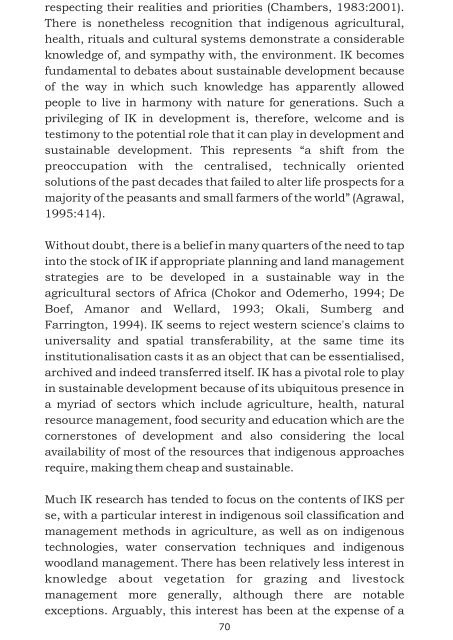Beneficiaries are actors too.pdf - Southern Institute of Peace ...
Beneficiaries are actors too.pdf - Southern Institute of Peace ...
Beneficiaries are actors too.pdf - Southern Institute of Peace ...
Create successful ePaper yourself
Turn your PDF publications into a flip-book with our unique Google optimized e-Paper software.
especting their realities and priorities (Chambers, 1983:2001).<br />
There is nonetheless recognition that indigenous agricultural,<br />
health, rituals and cultural systems demonstrate a considerable<br />
knowledge <strong>of</strong>, and sympathy with, the environment. IK becomes<br />
fundamental to debates about sustainable development because<br />
<strong>of</strong> the way in which such knowledge has app<strong>are</strong>ntly allowed<br />
people to live in harmony with nature for generations. Such a<br />
privileging <strong>of</strong> IK in development is, therefore, welcome and is<br />
testimony to the potential role that it can play in development and<br />
sustainable development. This represents “a shift from the<br />
preoccupation with the centralised, technically oriented<br />
solutions <strong>of</strong> the past decades that failed to alter life prospects for a<br />
majority <strong>of</strong> the peasants and small farmers <strong>of</strong> the world” (Agrawal,<br />
1995:414).<br />
Without doubt, there is a belief in many quarters <strong>of</strong> the need to tap<br />
into the stock <strong>of</strong> IK if appropriate planning and land management<br />
strategies <strong>are</strong> to be developed in a sustainable way in the<br />
agricultural sectors <strong>of</strong> Africa (Chokor and Odemerho, 1994; De<br />
Boef, Amanor and Wellard, 1993; Okali, Sumberg and<br />
Farrington, 1994). IK seems to reject western science's claims to<br />
universality and spatial transferability, at the same time its<br />
institutionalisation casts it as an object that can be essentialised,<br />
archived and indeed transferred itself. IK has a pivotal role to play<br />
in sustainable development because <strong>of</strong> its ubiquitous presence in<br />
a myriad <strong>of</strong> sectors which include agriculture, health, natural<br />
resource management, food security and education which <strong>are</strong> the<br />
cornerstones <strong>of</strong> development and also considering the local<br />
availability <strong>of</strong> most <strong>of</strong> the resources that indigenous approaches<br />
require, making them cheap and sustainable.<br />
Much IK research has tended to focus on the contents <strong>of</strong> IKS per<br />
se, with a particular interest in indigenous soil classification and<br />
management methods in agriculture, as well as on indigenous<br />
technologies, water conservation techniques and indigenous<br />
woodland management. There has been relatively less interest in<br />
knowledge about vegetation for grazing and livestock<br />
management more generally, although there <strong>are</strong> notable<br />
exceptions. Arguably, this interest has been at the expense <strong>of</strong> a<br />
70


